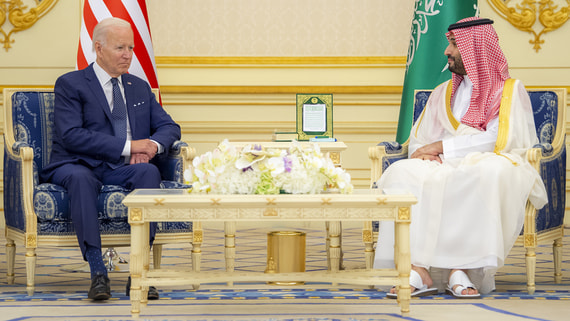US and Saudi Arabia discuss defense pact
[ad_1]

Saudi Arabia allegedly hopes to conclude a defense pact with the United States on terms close to clause 5 of the NATO collective security charter, according to which an attack on one member of the alliance is equivalent to a declaration of war on the entire bloc. In exchange, Riyadh could establish full diplomatic relations with Israel, several sources familiar with the discussions told Reuters on September 29.
The agency’s interlocutors noted that the Biden administration does not yet intend to provide the Saudis with security guarantees similar to NATO members. But as possible alternatives, Washington is ready to propose a format that provides for the conclusion of a strategic and economic pact similar to the September 13 agreement between the United States and Bahrain. Under this agreement, Washington and Manama agreed to cooperate in the military-technical and intelligence spheres. The countries also agreed to “contain and counter any external aggression,” with the caveat that U.S. and Bahraini authorities would hold bilateral consultations before responding.
According to Reuters, Washington may grant Riyadh the status of a “major non-NATO ally.” According to the State Department, outside the North Atlantic Alliance, the United States is allied with 18 states and, informally, Taiwan. They can participate in joint military exercises, as well as purchase weapons and shells with depleted uranium from the Americans. In addition, military companies from these countries can participate in tenders for the repair of American military equipment.
One of the main advantages of this format, sources say, is the absence of the need for ratification of the treaty by Congress. According to American law, the president is required to notify legislators of his intention to give any state the status of a US ally outside NATO 30 days before the announcement. But this procedure does not require official approval from the Capitol.
According to a Reuters source, a potential treaty with Saudi Arabia could be an “act of mutual understanding in the field of security” but not a full-fledged military alliance. The source suggested that the strategic relationship between the United States and the kingdom will be built by analogy with the relationship between the United States and Israel, which will allow Riyadh to gain access to the most modern types of American weapons.
In addition to security guarantees, the Saudis would like to enlist Washington’s support in implementing the Saudi peaceful nuclear program. In turn, not all Americans agree with the deepening of Saudi-American relations: 55% of respondents are against a potential union, according to the results of The Harris Poll, conducted at the end of August and commissioned by the Quincy Institute for Responsible Government.
Additionally, to normalize relations with Tel Aviv, Riyadh demands that the interests of the Palestinian people be taken into account. In an interview with Fox News, Saudi Arabia’s Crown Prince Mohammed bin Salman stressed that he hopes to make life “easier” for the Palestinians. But, according to Reuters sources, the Saudis are ready to continue dialogue with the Israelis, even if the Palestinians are dissatisfied with the progress of the negotiation process.
The United States fears a more active rapprochement between Saudi Arabia and China and Russia, so Washington is ready to discuss changing the format of Saudi-American interaction, says Viktor Mizin, a researcher at IMEMO RAS. The expert is convinced that the United States is in an almost hopeless situation, unable to either refuse the Saudis or accept their conditions. “It will be very difficult to push through a defense pact with the kingdom in Congress. Not about any full-fledged union [по примеру НАТО] there is no question between the USA and Saudi Arabia,” the expert believes.
According to Mizin, the current desire of the United States to reach an agreement with Saudi Arabia is also due to the ineffective attempts of the Americans to win Riyadh over to their side on the issue of pricing policy in the energy market. OPEC+ countries (an agreement of oil-producing countries in which Riyadh and Moscow play key roles) agreed to reduce oil production until the end of 2024, although it was previously assumed that the restrictions would remain in effect until the end of 2023. The agreed volume of reduction amounted to 1.4 million bbl. in a day. In addition, Russia and Saudi Arabia adopted additional restrictions on oil supplies to the global market (Vedomosti wrote about the current volume of supply reductions on September 20). The price of benchmark Brent oil is now stable above $90 per barrel.
The Saudis are putting forward conditions to the Americans in order to reduce for themselves the potential image and geopolitical costs that may follow after recognizing Israel as a kingdom, says RIAC program coordinator Ivan Bocharov. According to him, if the negotiation process is successfully completed, the Saudi authorities are unlikely to turn a blind eye to the violation of the rights of Palestinians by the Israeli authorities. “Saudi Arabia sees itself as the main defender of the Arab world, so they will not be able to ignore the Palestinian problem. It is no coincidence that the Saudis appointed their ambassador to Palestine for the first time,” the expert concluded.
[ad_2]
Source link








